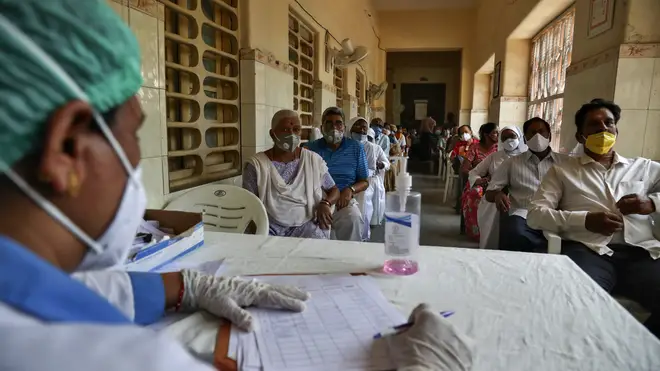
Vanessa Feltz 3pm - 6pm
13 April 2021, 07:54

India is averaging 3.6 million jabs every day.
India is experiencing its worst pandemic surge, with average daily infections exceeding 130,000 over the past week.
The spike, which can be seen across the country, is particularly alarming because the country is a major vaccine producer and a critical supplier to the UN-backed Covax initiative. That program aims to bring jabs to some of the world’s poorest countries.
Already the rise in cases has forced India to focus on satisfying its domestic demand — and delay deliveries to Covax and elsewhere, including the UK and Canada.
India’s decision “means there is very little, if anything, left for Covax and everybody else,” said Brook Baker, a vaccines expert at Northeastern University.
Pune is India’s hardest-hit city, but other major metropolises are also in crisis, as daily new infections hit record levels and experts say that missteps stemming from the belief that the pandemic was “over” are coming back to haunt the country.
When infections began plummeting in India in September, many concluded the worst had passed.
Masks and social distancing were abandoned, while the government gave mixed signals about the level of risk.
When cases began rising again in February, authorities were left scrambling.
“Nobody took a long-term view of the pandemic,” said Dr Vineeta Bal, who studies immune systems at the city’s Indian Institute of Science Education and Research.
She noted, for instance, that instead of strengthening existing hospitals, temporary sites were created.

In Pune, authorities are resurrecting one of those makeshift facilities, which was crucial to the city’s fight against the virus last year.
India is not alone. Many countries in Europe that saw declines in cases are experiencing new surges, and infection rates have been climbing in every global region, partially driven by new virus variants.
Over the past week, India had averaged more than 130,000 cases per day. It has now reported 13.5 million virus cases since the pandemic began — pushing its toll past Brazil’s and making it second only to the US, though both countries have much smaller populations.
Deaths are also rising and have crossed the 170,000 mark. Even those figures, experts say, are likely an undercount.
Nearly all states are showing an uptick in infections, and Pune — home to 4 million people — is now left with just 28 unused ventilators as of Monday night for its more than 110,000 Covid-19 patients.
The country now faces the mammoth challenge of vaccinating millions of people, while also contact-tracing the tens of thousands getting infected every day and keeping the health system from collapsing.

Compounding concerns about rising cases is the fact that the country’s vaccination drive could also be headed for trouble: Several Indian states have reported a shortage of doses even as the federal government has insisted there is enough in stock.
After a sluggish start, India recently overtook the US in the number of jabs it is giving every day and is now averaging 3.6 million.
But with more than four times the number of people and that later start, it has given at least one dose to around just 7% of its population.
India’s western Maharashtra state, home to Pune and financial capital Mumbai, has recorded nearly half of the country’s new infections in the past week. Some vaccination centres in the state turned away people due to shortages.
At least half a dozen Indian states are reporting similarly low stocks, but Health Minister Harsh Vardhan has called these concerns “deplorable attempts by some state governments to distract attention from their failures”.
Worries about vaccine supplies have led to criticism of Prime Minister Narendra Modi’s government, which has exported 64.5 million doses to other nations.
Rahul Gandhi, the face of the main opposition Congress party, asked Mr Modi in a letter whether the government’s export strategy was “an effort to garner publicity at the cost of our own citizens”.
Now, India has reversed course. Last month, Covax said shipments of up to 90 million doses of the AstraZeneca vaccines were delayed because the Serum Institute of India decided to prioritise domestic needs.

The institute, which is based in Pune and is the world’s largest vaccine maker, told The Associated Press earlier this month that it could restart exports of the vaccine by June — if new coronavirus infections subside. But a continued surge could result in more delays.
And experts warn that India could be looking at just that.
They suspect the most likely cause behind the widespread surge is the presence of more infectious variants.
Health officials confirmed last month that 80% of infections in the northern state of Punjab were due to the version of the virus first detected in the UK.
There is also increasing concern about another new and potentially troublesome variant that was first detected in India itself.
Dozens of cities and towns have imposed partial restrictions and nighttime curfews to try to curb infections, but Modi has ruled out the possibility of another nationwide lockdown. He also rejected calls from states to offer vaccinations to younger people.
Experts, meanwhile, say the current limit of offering vaccine to those over 45 should be relaxed and that shots need to be targeted in areas experiencing surges.